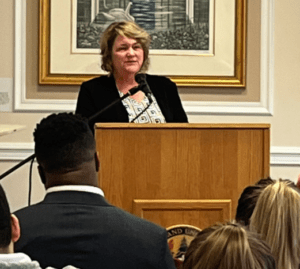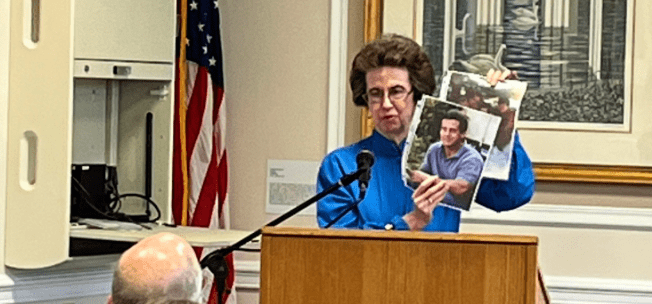An often-overlooked flaw of capital punishment is that it turns its supporters into de facto killers themselves, an opponent of the practice said during “Life Beyond the Death Penalty,” hosted by Ohioans to Stop Executions.
Chicagoan Gail Rice, whose police officer brother was killed in the line of duty in November 1997, added that state-sanctioned executions are revenge killings for which there is a moral consequence.
“God help us. If I deny a Death Row inmate’s humanity, then I’m adopting an attitude that’s not very different from the attitude the killer had when he killed my brother. He certainly didn’t value Bruce’s life.”
The April 19 event in Ashland, Ohio, was the latest effort by death penalty abolitionists to press state lawmakers to approve capital punishment-ending bills currently pending in the House and Senate.
“If I deny a Death Row inmate’s humanity, then I’m adopting an attitude that’s not very different from the attitude the killer had when he killed my brother.”
Rice said she has spent nearly 20 years as a volunteer adult literacy specialist in Illinois jails and prisons and through that experience has seen many criminals experience major transformations over time.
“The death penalty cuts off the possibility of forgiveness, reconciliation and redemption that Christ always wants me to work toward,” she said. “It is a violent act of retribution and revenge. As a Christian, how can I accept those attitudes?”
Executions also fly in the face of Scripture, Rice said. “Because the death penalty is especially unfair to poor and minorities, it makes a mockery of God’s preferential caring for the powerless and most vulnerable that Micah is always talking about.”
Another troubling fact about the death penalty is that innocent people frequently are sentenced to death, often due to racial prejudice, false or perjured testimony, prosecutorial and police misconduct, botched crime scenes or incompetent legal representation, she said. “As the sister of a police officer I get outraged when I hear of police or prosecutors knowingly participating in wrongful convictions.”
But the main reason Rice said she opposes capital punishment is simpler and much more powerful: “I feel it completely violates my Christian faith and values.”

Terrie Bonfiglio
Ashland, Ohio, resident Terrie Bonfiglio warned against the misconception that capital punishment serves as a deterrent to violent crime and that it brings healing to victims’ families: “I’m here to tell you tonight that’s a fallacy. Neither of those two things are working, and when the death penalty was brought about, we were led to believe this is a good thing.”
Bonfiglio’s uncle was murdered in Tampa, Fla., in 2000, devastating a church-going family replete with military and law enforcement members.
“So, you might think with that conservative background and that happening to our family, that of course I would be for the death penalty — where’s the plug? Let me plug Sparky in. Well, the broad truth of it, because of the delays, because of all of the things I saw my aunt and all my cousins go through, I thought there has got to be a better way.”
That better way came to her through prayer sessions in which she felt God pointing out the hypocrisy of a pro-life Catholic being for the death penalty.
“You cannot be all in for no abortion, pro-life over here on this side, and on this side of life you have someone who has done something wrong — and clearly needs to pay for it — but being OK with them dying.”
Bonfiglio said she also came to see the moral damage capital punishment does to those judges, prosecutors and police involved in death penalty cases but especially to prison workers directly involved with the lethal injection process.
“I decided I was going to stand up for absolute life on the beginning of life and on the end of life.”
“I decided I was going to stand up for absolute life on the beginning of life and on the end of life,” she said.
It was a similar evolution in thinking that Demetrius Minor said transformed his convictions about the immorality of the death penalty.
“I said there has to be consistency within my pro-life views and if I am going to be pro-life, I have to be pro-life all the way,” said Minor, national manager of Conservatives Concerned About the Death Penalty.
Given that Jesus died for all humanity, Minor said he came to see that it was “spiritually negligent” to condemn murderers to death.
“We cannot determine in our finite wisdom when God is done working on someone’s heart or when the expiration date has arrived for that particular individual,” he said.
Related articles:
How I came to oppose the death penalty | Opinion by Stephen Reeves
The death penalty is dying a slow death; it’s time we pull the plug | Analysis by Stephen Reeves
In Ohio, Republicans are leading the effort to abolish the death penalty
It’s official now: Death penalty no more in Virginia
American support for death penalty remains low, as new debates arise in Oklahoma, Ohio and Texas

